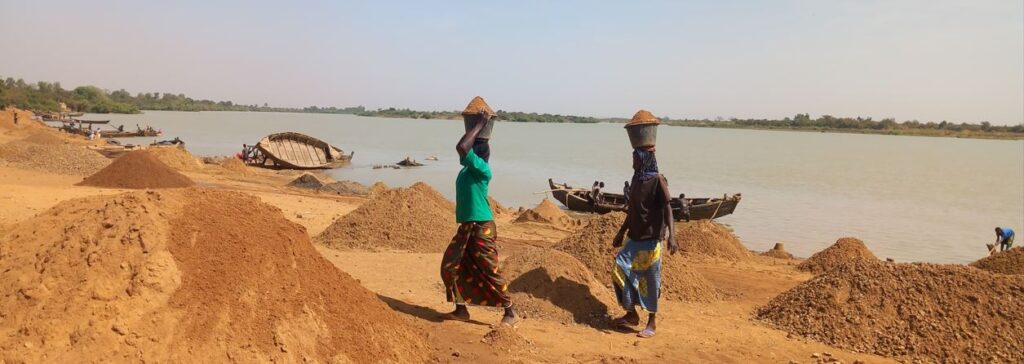MALI – In the village of Farabana, people earn their daily living by sand mining. This is heavy and dangerous work, and the activities pollute the Niger River. It is time for action.
Sand, like air and water, is an intensively used resource on Earth, including in the building industry. Since 1972, sand mining has become a favorite activity in the Malian municipality of Mandé. In Mandé’s villages located along the Niger, such as Farabana, sand mining has become one of the most important economic activities. After all, there are few alternatives to earn a living. Once practiced by about 50 people, sand mining now employs more than 1,000. Both men and women and especially children under the age of 15 are employed in it.
Heavy work…
Sand extraction is usually done by hand and it requires strenuous physical effort from everyone. First, divers fill baskets with sand from the river bottom. They bring the baskets to the surface and load them into canoes that carry their loads to the banks. The women unload the canoes and collect the sand lost in unloading into piles on the banks. When a load is sold, dump trucks are filled with sand, which go to supply the construction sites of the capital (Bamako) and surrounding areas. Everything is done by hand and without suitable tools; it is extremely hard work.
Since agriculture, like other activities, yields too little, sand mining is considered a reliable alternative with low investment costs. Several entrepreneurs manage to generate a daily income of 2 to 8 euros per person, which is very satisfactory. This allows them to meet family needs such as food, health, education.
… unsafe
Sand mining is also a risky business. Equipped with paddles, ropes, sieves, shovels, small buckets … the men and women work without individual protection or other safety measures. They are exposed to water-related diseases and risks of accidents.
No formal regulations exist today for sand mining in Farabana. The community reportedly rejected the municipal authorities’ request to regulate this activity for fear of abuse or a takeover of the operation by the municipality. However, the operators of Farabana have organized themselves and created some rules of their own to avoid possible conflicts. According to the rules, all activities in the river are free. Another rule is that as an operating license, the operators pay about 8 euros per canoe monthly to the respective villages where sand is extracted.
… and polluting
Today, sand mining poses a threat to the river. Along the banks, people are constantly walking back and forth, canoes of all sizes line the banks. Thus the water becomes polluted, the river bed shrinks, certain species of fish disappear, more people suffer from water-related diseases, and regularly someone drowns.
Today, the banks of the Niger along Farabana have turned into landfills or sites for selling sand, and we no longer have the river on our land, farmers tell us. In the past, sand was a very rich resource, but overexploitation has made it virtually unavailable, forcing farmers to look elsewhere for suitable resources.
Time for action
Join For Water and its partners, after a thorough study, got a good view of the overall condition, the pressures on the ecosystem and also the possible solutions in terms of ecosystem restoration and their services. The people of Farabana are well aware of the challenges and issues surrounding the degradation of the Niger River. Actions have already been taken to conserve and restore this resource for the village. But due to the extent of degradation and pollution of the river, these actions unfortunately remain inadequate. Actions must also be able to continue long enough.
Join For Water and its partners foresee a set of ecosystem restoration activities for the coming years, such as on these parts of the Niger. Activities will be reinforced by environmental education activities in schools and action research. There will also be a study on regulations in terms of environmental protection. The conclusions of this study will be used to support local actions. Join For Water, the local NGO CSPEEDA and the research institutes have sufficient expertise to do this.

